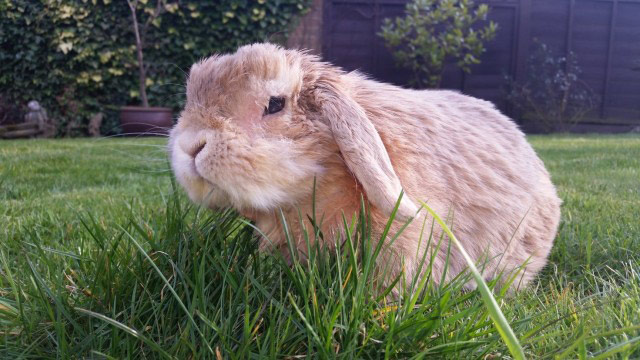How to Get a Rabbit Neuro Working Again
Marley, a 3 and a half year old lop rabbit, was presented to Calder Vets by his owners who had noticed that Marley was struggling to employ his dorsum legs. Despite beingness unwilling to move effectually, Marley was vivid and eating.
Careful veterinary examination did not reveal any cleaved bones, wounds or painful areas. However, every bit rabbits are prey species they notoriously hide signs of pain making the pain assessment difficult.
Diagnosis
At this phase trauma, such every bit the result of an unseen fall, inflammatory disease of the joints, degenerative changes with narrowing of the spaces between the vertebra or a fracture of the spine were all considered possible causes. Marley was admitted for supportive intendance to ensure he was comfy and further investigations to assess the underlying cause. Over the next 24 hours Marley'south status deteriorated: he became weak, wobbly and unable to support his weight on all iv legs. Blood tests did not reveal any abnormalities. Radiographs (x-rays) were taken of Marley'due south spine but did non reveal whatever obvious fractures. A congenital malformation was noted but this wasn't considered the cause of his weakness.
Floppy Rabbit Syndrome
A diagnosis of 'Floppy Rabbit Syndrome' was made. Floppy Rabbit Syndrome (FRS) is considered an acute neurological condition characterised past a sudden inability to hop effectually. The muscles of the legs and sometimes the neck are flaccid. FRS remains a poorly understood diagnosis in rabbits, with research ongoing in an effort to identify an inciting cause. Diverse theories have been suggested including low blood calcium, low blood potassium, vitamin E and selenium deficiency, infection with the parasite Enecephalitozoon cuniculi and ingestion of plant or fungal toxins.
Like Marley, affected rabbits are warning and will eat and drink if food and water is provided within their reach, although supplementary syringe feeding is often necessary. Although they can urinate and defecate, care is needed to ensure that rabbits with FRS exercise non become soiled as they are unable to motion away from the waste they produce. Therefore careful nursing is essential for these patients. Every bit Marley started to make an improvement, his owner bought in his litter tray in the promise that the familiar 'toilet' would encourage him to move to reach information technology. By his last day in the hospital, Marley had achieved this!
Recovery
The prognosis for FRS is guarded to practiced. Many cases recover inside a week with intensive nursing care, regardless of treatments administered. Unfortunately some cases tin dice from respiratory failure. Some rabbits only take a single episode, whilst repeated episodes, ofttimes post-obit a period of stress, have been reported in other cases. Since other diseases can cause like signs, diagnostic tests including serology for the protozoan parasite Encephalitozoon cuniculi, CT/MRI scanning of the encephalon and spinal cord, cerebrospinal fluid assay and electromyelography can be considered but they can are expensive.
Complications
Ane particular secondary business concern in sick, stressed or hospitalised rabbits like Marley is the evolution of 'gut stasis', where the normal motility of the alimentary canal slows or stops, resulting in painful distension of the gut, lack of ambition and reduced or absent-minded faecal output. Left untreated, this in itself could be fatal. In order to prevent this, gastroprotectant medication, gastrointestinal motility stimulants and back up feeding were all provided. The nurses diligently checked and fed Marley throughout the twenty-four hour period and dark.
As Marley was an indoor rabbit, he was strongly bonded to his owners, significant that their dedication in visiting Marley to encourage him to swallow was as well an extremely important factor in his recovery. Marley was discharged iv days after his initial presentation and lived a farther 3 years, achieving celebrity status amongst the nurses who were delighted to see the loveable Marley when he came for his regular dental checks with Shona. The fact that Marley made a full recovery highlighted the importance of not giving up too soon on rabbits suffering from FRS.

Tribute
Calder Vets would like to say a sad cheerio to a much-loved rabbit, Marley. Marley became something of a celebrity amongst both the vet and nursing teams at Calder Vets following his recovery from an episode of Floppy Rabbit Syndrome in 2012. During his lifetime Marley also made regular visits to the practice for ongoing management of his chronic dental affliction to ensure that he was comfortable and able to chew properly (known as Progressive Syndrome of Acquired Dental Disease). Vet Shona first met Marley in January 2011 and looked after him during his visits to the vets until his passing in Dec 2015. Looking afterward Marley was a great case of team work between his caring, dedicated owners Allison and Mike and the Veterinary staff.
Rabbits can live until around x years old, and therefore many rabbits suffer from chronic conditions. However, once identified many of these can exist managed to ensure that, like Marley, the rabbit enjoys an first-class quality of life. Sleep Well Marley.
Source: https://www.caldervets.co.uk/pet-help-advice/case-studies/32-marley-floppy-rabbit-syndrome
0 Response to "How to Get a Rabbit Neuro Working Again"
Post a Comment